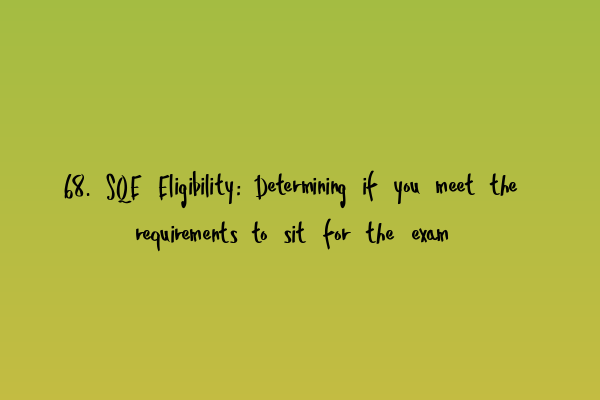SQE Eligibility: Determining if you meet the requirements to sit for the exam
Are you considering taking the Solicitors Qualifying Exam (SQE) to become a qualified solicitor in England and Wales? It’s important to understand if you meet the eligibility requirements before you can sit for the exam. In this article, we will discuss the key eligibility criteria and help you determine if you are eligible to take the SQE.
1. Academic Qualifications
The first eligibility criterion for the SQE is having the required academic qualifications. You must possess a degree or equivalent qualification recognized by the Solicitors Regulation Authority (SRA). The SRA accepts a wide range of degrees, including law degrees from both domestic and international universities.
If you obtained your degree outside of the UK, it is important to check if it meets the SRA’s equivalency requirements. You may need to provide additional documentation or undergo an assessment to demonstrate equivalency.
2. Character and Suitability
The SRA places a strong emphasis on the character and suitability of individuals who wish to become solicitors. As part of the SQE eligibility process, you will need to undergo a character and suitability assessment to ensure that you meet the necessary standards.
This assessment will consider factors such as any criminal convictions, bankruptcies, or disciplinary actions against you. It’s important to be honest and transparent during this process, as any discrepancies or misrepresentations may negatively impact your eligibility.
3. English and Welsh Language Skills
Since solicitors in England and Wales practice in English, it is essential to have a high level of proficiency in the English language. The SQE eligibility criteria include demonstrating a command of both written and spoken English.
If English is not your first language, you may need to provide evidence of your language proficiency by successfully completing an approved English language test, such as the International English Language Testing System (IELTS).
4. Experience Requirement
Along with the academic qualifications, the SRA requires candidates to have a minimum of two years of practical work experience before they can take the SQE. This experience can be gained through legal work, non-legal work that is relevant to legal practice, or a combination of both.
During this period, it is important to gain exposure to different areas of law to develop a well-rounded understanding of legal practice. This experience will not only contribute to your eligibility for the SQE but also enhance your overall legal knowledge and skills.
5. Registration and Application
Once you have determined that you meet the eligibility requirements, the next step is to register and apply for the SQE. The SRA manages the registration and application process, and you will need to provide the necessary documentation and pay the required fees.
It is important to review the registration deadline and ensure that you submit your application within the specified timeframe. Late applications may not be accepted, so it’s crucial to stay organized and plan ahead.
Conclusion
The SQE is a comprehensive exam that tests candidates on their legal knowledge and skills. Before you can sit for the exam, it is important to determine if you meet the eligibility requirements set by the SRA.
Evaluating your academic qualifications, character and suitability, language skills, and practical experience are crucial steps in determining if you are eligible to take the SQE. By carefully reviewing these criteria and completing the necessary steps, you can position yourself for success in your journey to become a qualified solicitor.
For further guidance on preparing for the SQE, you may find these related articles helpful:
